LONDON (Velo) — At the launch of his Ekoi textile collection in a boutique west London hotel, Britain’s first Tour de France champion is adamant.
This is Bradley Wiggins 2.0, he says, a second phase of his life.
“Part of this kit and working is my reintroduction to cycling. Two years ago, I never anticipated throwing my leg over a bike ever again. I hated cycling and I’ve come full circle with that now,” Wiggins said.
But beyond that, after a damaging period in his private life in the last few years, it is “the rebirth of me as a person.”
After all he’s been through since becoming Britain’s first Tour de France winner in 2012, just being here now is a win.
From podiums to problems: ‘I had a drug addiction’
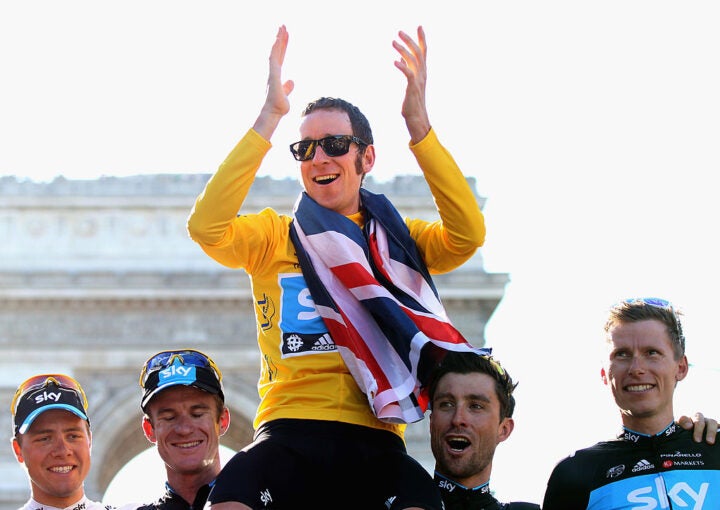
Wiggins is Britain’s original modern road racing champion, becoming a stage racing star when he joined Team Sky for the team’s debut 2010 season.
Now 45, his cycling career peaked when he won the 2012 Tour and the Olympic time trial in the space of a fortnight, making him one of the most famous athletes in the United Kingdom.
Since retiring from pro cycling at the end of 2016, he has experienced plenty of difficulties and drama in his personal life. In 2020, he divorced from wife Cath and last year, he was declared bankrupt.
There was also an unspecified period, up to last year, when he was drinking heavily and taking other substances.
“I had a drug addiction as well, I was doing s***tloads of cocaine, I had a real bad problem,” he says, in a candid joint interview with Velo, the Guardian and Cycling Weekly ahead of the Ekoi launch last week.
“My kids were going to put me in rehab at one time. And I’ve never spoke about that: I was walking a tightrope. There were times my son thought I was going to be found dead in the morning. I was a functioning addict as well … I’m lucky to be here.”
n°2221, @lemaglequipe
BRADLEY WIGGINS
D’OR ET DE MISÈREClara Lahaye/@lequipe pic.twitter.com/Tg8mB3YPhm
— Le magazine L’Équipe (@lemaglequipe) April 24, 2025
Wiggins says he is now nearly 12 months sober, seeking help of his own accord after realizing he had a “huge problem”.
“Now I’m the other way, like a dedicated athlete again,” he says. “It’s the only way I can live. There’s no middle ground for me. I can’t just have a glass of wine – if I do that, I’m buying drugs.”
Wiggins believes his proclivity for addiction was a way of easing pain that came from a harrowing childhood which included his father Gary, an Australian track racer, walking out on the family when he was five years old and later sexual abuse from a cycling coach.
“I’m still figuring a lot of this out, but what I have got now is a lot more control of myself, my triggers. I’m a lot more at peace with myself,” he says.
A British cycling prodigy: ‘I never felt satisfaction’
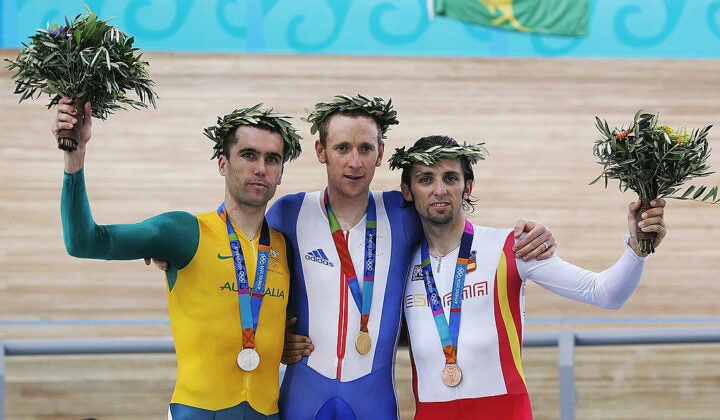
Wiggins turned pro in 2001 with the Linda McCartney team and he immediately made an impact both on the boards and on pavement.
A graceful time-trial talent and track star, his road racing career took off after finishing fourth in the 2009 Tour de France with U.S. squad Garmin-Slipstream.
Becoming the leader of the new, big-budget Sky team, combining time-trial dominance with consistent racing in the mountains, he went on to win 30 races, including the 2012 Tour de France, five Olympic gold medals, the world time-trial title in 2014, and a host of WorldTour stage races, including Paris-Nice, the Critérium du Dauphiné and Tour of California.
However, he often failed to feel real happiness at his sporting feats.
“It was giving me fulfillment that I’d gone through a process and achieved that,” he says. “Everyone was happy around me. I don’t think I ever really felt the full satisfaction for myself and what I’ve done. I’m a people pleaser.”
Jiffy-gate mystery rumbles on
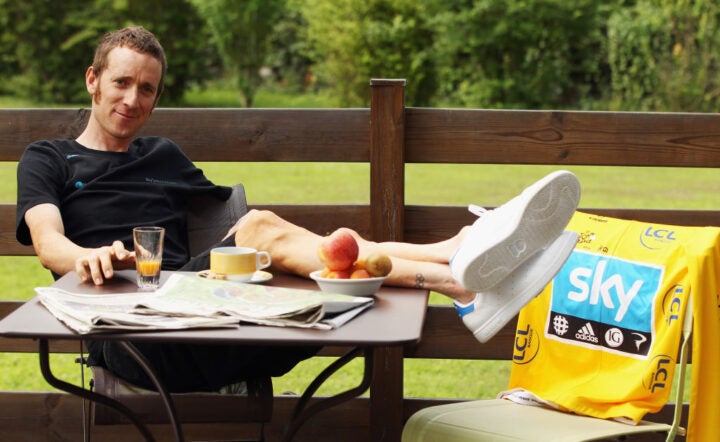
In 2016, after hacker group Fancy Bears published therapeutic use exemptions (TUE) certificates for Wiggins and teammate Chris Froome, it came to light that he had three in total for triamcinolone, a corticosteroid, from the UCI to treat asthma ahead of the 2011 and 2012 Tours de France and 2013 Giro d’Italia.
According to the leaks, British Cycling coach Simon Cope flew out to the final stage of the 2011 Critérium du Dauphiné, a race that Wiggins won, and left a mysterious package for team doctor Richard Freeman.
If Wiggins was treated with triamcinolone on the race’s final day, it would count as an anti-doping violation, punishable by a two-year ban and loss of results.
Wiggins says that he did not get a jab on the team bus and went to Sestriere afterward on the Italian border (for a training camp).
“That’s where we got treated with fluimucil that night. But the story grew legs because it was said I’d had a jab on the bus at the finish, which wasn’t the case,” Wiggins said.
“But then Dave [Brailsford, former Team Sky principal] intervened and said the bus had left. Then video was found [showing] that the bus was still there. And I had no control over what was said on that front.”
ICYMI Exclusive @BBCNews at 6 interview with Sir Bradley Wiggins @SirWiggo as GB’s most decorated Olympian denies MP’s accusations he “crossed the ethical line” pic.twitter.com/aS8LKy6JYt
— Dan Roan (@danroan) March 5, 2018
Shane Sutton, Wiggins’ coach at Team Sky, and Dave Brailsford later appeared in front of the British government’s Digital, Culture, Media and Sport (DCMS) select committee.
Brailsford said to them that Freeman had told him the package contained fluimucil, a decongestant used for clearing mucus, to treat Wiggins’ asthma
It was later queried why Cope would travel over 1,000 kilometers to deliver a product purchasable from a French or Italian pharmacy.
Freeman later withdrew from giving evidence due to illness and indicated that a key laptop, containing records, was stolen while he was on holiday.
Wiggins is aware that he was the scapegoat.
“The amount of times I got asked, what was in the package? I had no idea, f*** knows,” he says.
The affair was dubbed “Jiffy-bag gate” after the British expression for a padded shipping envelope.
Both Team Sky and the Briton himself refuted claims of wrongdoing. UK Anti-Doping (Ukad) brought no charges after being “unable” to prove the package contained fluimucil.
Fourteen years on from the actual delivery of the package, there is still no definitive answer as to what was inside it, just a multitude of different accounts.
“I would love to know one way or the other what actually happened,” Wiggins says.
Why it was win at all costs for Wiggins
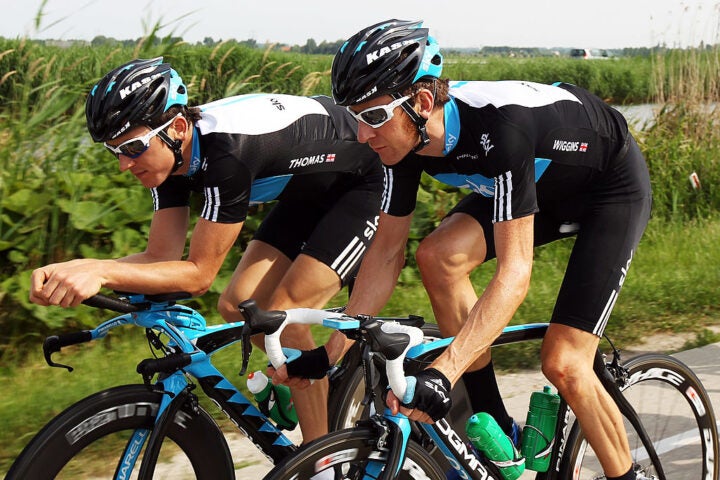
Wiggins has been working on a “graphic” and “raw” autobiographical book, entitled The Chain, due to be published in late 2025. It will go into detail about his childhood traumas, his father’s murder in Australia, and how they all link to his cycling career.
The act of working on the book and undergoing weekly therapy sessions in London have also led to the Briton realizing new things about himself.
“I learned pretty quickly that I have got to win races at all costs so I get a ride home,” he says.
Wiggins gives a case in point from his youth racing career: if he did well at a bike race as a 13-year-old, he would be treated to a trip to an ice cream parlor near his north London home. If he did not perform well, he would be left by his stepfather and mother to make his own way home, sometimes more than 40 miles away.
“I learned quickly that if I won races, I got rewarded for it. That was ingrained in me. That was where my striving to win came from, that’s why I was able to commit myself to goals,” Wiggins says.
Winning became his drive, which is at odds with his core personality.
“People talk about Michael Jordan, people like that, they’re winners. I was never a winner, I never considered myself that. I don’t have to win at life. I’m not competitive at all. I just learned what the repercussions were for not winning at a young age.”
Playing different roles: ‘There was a lot of anger’
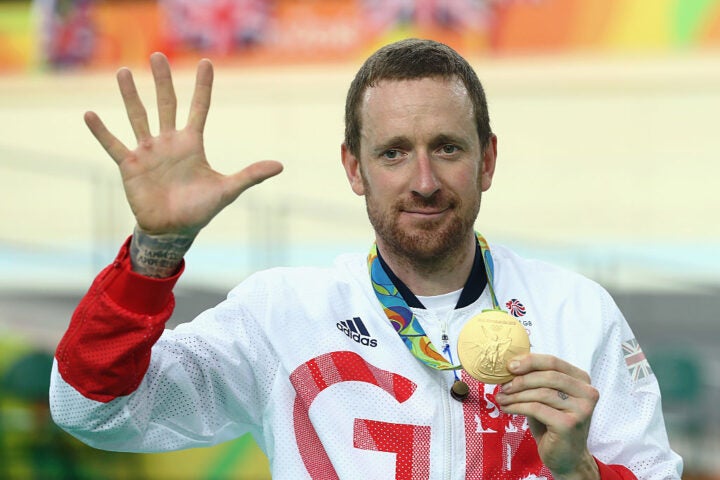
As an adult, Wiggins’s changing public persona – the mod, the joker, the aloof avoidant – was a way of disguising his true self.
“My worth as a person was only ever attached to winning. And that was from childhood as well: no one ever said forget cycling, you’re enough as a person … there was a lot of anger, pent-up anger.”
Linked to that, Wiggins describes himself as someone who was in “fight or flight” mode all the time for years, either responding abrasively to critics or being unreliable, climbing off unexpectedly in a race, or not turning up to events.
28 April 1980. Bradley Wiggins was born in Ghent, Belgium. He was the 1st British cyclist to win the Tour de France. He won a gold medal at 4 successive Olympics from 2004 to 2016. In June 2024 he was declared bankrupt. pic.twitter.com/viWt2Mu9YV
— Frank McDonough (@FXMC1957) April 28, 2025
“I know the person I was when I stopped off the bike, and it was erratic, one or the other. And I was also very, very insecure as a person, I had a lot of self-esteem issues, which I realize now. My worth as a person was not reflective of the confidence I had on the bike.
“I could execute an Olympic [2012 time-trial] final around Hampton Court in front of millions of people. The minute I stepped off the bike and had to be me, I’d have to do something funny,” he says, referring to the ‘V’ sign for victory he made with his fingers.
“Or let’s call the raffle numbers,” he says, reprising his line into a microphone on the podium after winning the 2012 Tour de France.
The future for Wiggins 2.0
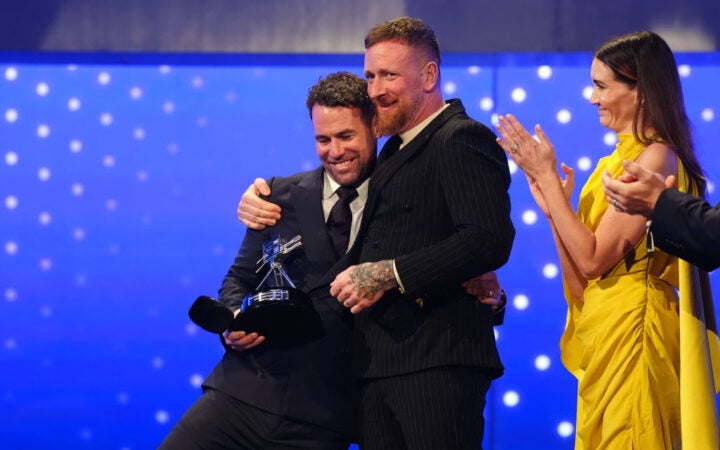
Wiggins has spent some time in America in 2025, receiving help from Lance Armstrong and appearing occasionally on his The Move podcast.
Armstrong, who Wiggins describes as a “life-saver in many ways”, is financing an intensive therapy for Wiggins in Atlanta.
The 45-year-old plans to make podcast appearances with Armstrong during the forthcoming Tour de France and has designs on creating his own cycling history podcast. He hopes to get former Sky teammate Chris Froome to collaborate on one episode to discuss their past and now-mended feud.
“We’re mates now. I know my part in it, I probably amplified and informed a lot of it, the person I was. Chris wasn’t much better. But ultimately, we were a threat to each other … we were both ambitious and played off by Dave [Brailsford], Team Sky’s then-principal] in many ways. I was naive at the time in thinking we were one big happy family and that shouldn’t happen.”
Bradley Wiggins joins Lance Armstrong’s podcast The Move. Read more here: https://t.co/HwpMP91AxI pic.twitter.com/JDbJ9ZRUsN
— Cycling Today (@CyclingTodayEn) July 9, 2024
Looking to the future, he enjoys seeing his 20-year-old son Ben race. The young Briton, currently competing for leading development team Hagens Berman Jayco, could potentially turn pro in 2026.
Past, present, and future, cycling is a mainstay for Wiggins.
“I’ve accepted in the last 12 months, however much I try and push it away, cycling is my life, and it always will be part of my life. I think I caused myself more pain trying to push it away,” Wiggins says.
“I got given a bike to ride and forgot how much I love being out on it. Whenever I get on a bike, it reminds me of being 13, and how unhappy I was when I was 13. Being on a bike was my escapism.
“Ultimately, it’s where I get the most pleasure. It’s my sanctuary.”
Editor’s note: In the U.S., you can call or text the National Suicide Prevention Lifeline on 988, talk on 988lifeline.org, or text HOME to 741741 to connect with a crisis counselor. In the UK, Samaritans can be contacted on freephone 116 123, or email jo@samaritans.org.
